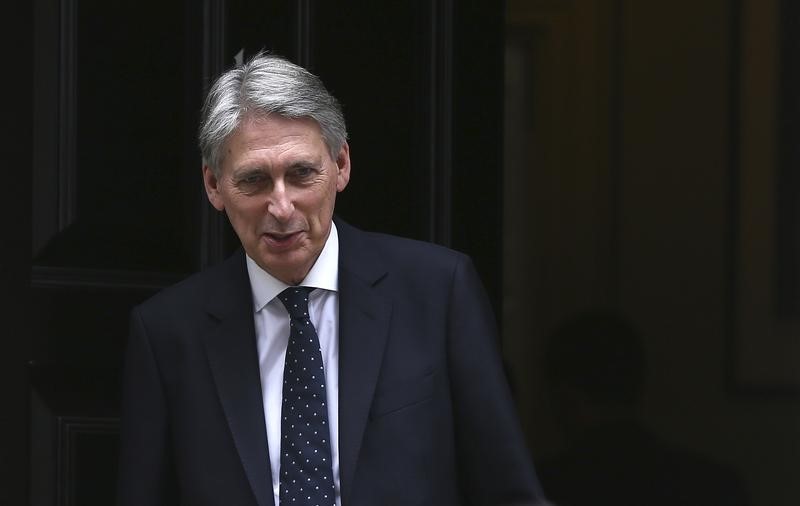By William Schomberg
LONDON (Reuters) - Britain's first budget plan since the Brexit vote will not include a big new spending push because of "eye-wateringly" high public debt levels, but will have some help for the economy and struggling families, the country's Chancellor said.
Philip Hammond, who will spell out the economic priorities of the new government on Wednesday, said on Sunday he wanted to keep some fiscal "head-room" as two years of difficult negotiations about leaving the European Union approach.
"Over the next couple of years we are going to face some uncertainty over the economy," he said in an interview with BBC television on Sunday.
"But then we will have a whole raft of opportunities and we need to get the country ready to be able to seize those."
Britain's economy has so far defied forecasts of an immediate Brexit recession made by Hammond's predecessor George Osborne, reducing the urgency for a major fiscal stimulus.
But most economists expect a sharp slowdown in 2017, pushing up unemployment at a time when inflation is likely to rise sharply, further squeezing many households.
Prime Minister Theresa May has promised to work for "just managing" Britons, many of whom delivered the biggest British political upset in generations in June's vote for Brexit.
This month's surprise victory of Donald Trump in the U.S. presidential election underscored the degree of frustration with living standards felt by voters around the world.
Hammond is expected to announce measures to help struggling families, such as targeted tax cuts, when he delivers the half-yearly Autumn Statement budget update in parliament.
"We've got to make sure that the prosperity that comes from seizing opportunities ahead is shared across the country and across the income distribution," he told the BBC.
Two British newspapers said Hammond was considering a temporary cut to value-added tax, which would help poorer families most but would be costly to the public finances, as an option that he might use next year.
But with public debt of 1.6 trillion pounds, equivalent to 84 percent of economic output last year, its highest level in nearly 50 years, Hammond said the government was "highly constrained".
ROADS, STRATEGY
Earlier on Sunday, the Treasury announced 1.3 billion pounds ($1.60 billion) in new spending on roads as part of the plans to increase Britain's weak productivity growth.
May is expected to speak on Monday about plans her ministers are drawing up for a new industrial strategy.
Britain's opposition Labour Party said the government was being too timid with its modest plans for spending increases.
"It's a minor change in direction when this Autumn Statement should be a significant reversal of economic strategy," John McDonnell, Labour's top finance official, told the BBC.
He said Labour wanted a 500 billion-pound boost to investment over a decade, half of it public money and the rest from the private sector, to speed up Britain's economic growth and reduce the need for cuts in welfare spending.
The Treasury made it clear it was considering a smaller programme. It said it had identified quick-turnaround infrastructure projects and upgrades to existing networks that would help to relieve road congestion.
British employers have long called for more investment in the country's road network but they also have broader concerns about the risks of Brexit, chief among them how much access they will lose to the EU's single market and limits on their ability to hire workers from the bloc's 27 other countries.
In his interviews on Sunday, Hammond sought to play down suggestions from other government ministers that Britain should aim for a clean break with the EU, saying all options remained on the table.
The Treasury also said Hammond's approach on the budget would be different to that of Osborne by limiting announcements to top-level spending decisions "rather than announcing full details of individual projects".
Hammond has already dropped Osborne's plan to turn Britain's budget deficit into a surplus by 2020. He declined say whether he might revert to the Osborne's earlier fiscal targets of aiming for a budget surplus excluding investment spending.
